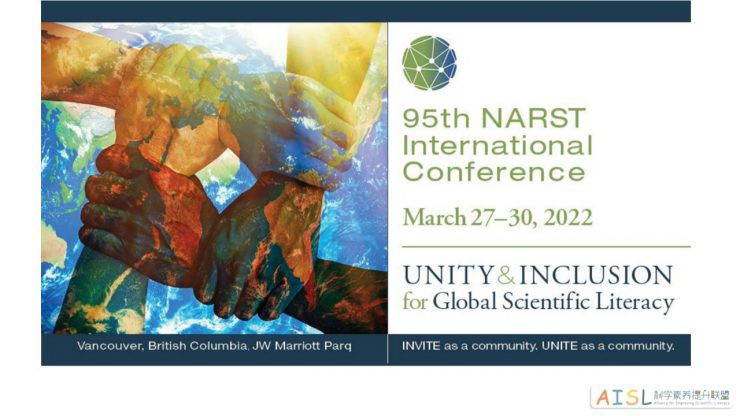第95届NARST国际年会于北京时间3月27日至31日以线上线下混合的形式举行,线下会场位于加拿大温哥华。林静课题组成员线上参加此次年会并进行了学术报告与交流。
NARST(National Association for Research in Science Teaching)成立于1928年,是全球最具权威且影响力最大的科学教育学术组织,每年召开的学术年会是科学教育研究者互相交流合作、把握未来科学教育研究方向的重要平台。今年,NARST年会主题为“团结包容共同促进全球科学素养(Unity and Inclusion for Global Scientific Literacy)”,彰显了该组织对科学教育中融入社会文化因素与全球协作的关注。

北京师范大学中国基础教育质量监测协同创新中心科学提升部主任林静携课题组成员张乐潼、韦文婷等人在NARST 2022会议中报告了中小学科学教育方面的“中国故事”。报告的一项研究为科学建模与空间可视化关系。该研究与台湾师范大学张俊彦教授团队合作完成,关注中小学生空间可视化对科学建模的预测作用,并发现随着学生年级增长,空间可视化与科学建模的关系逐渐减弱。该研究成果为促进科学建模的教学提供了指导,也为科学建模相关的学术研究提供了新视角。第二项研究是重访中国小学生科学家刻板印象,发现小学生对科学家刻板印象更深并在不同的年级和性别的学生中存在一定差异,为深入小学生科学本质观研究、审视中国小学科学课程实施质量提供一类数据。第三项通过调查中国在职科学教师科学本质观,发现中国科学教师对于理解科学本质观中的创造力维度比较困难,不同背景的科学教师对科学本质观的理解相对一致。还有一项研究是与以色列魏兹曼科学研究院(Weizmann Institute of Science)教授David Fortus合作,关于中国和以色列师生远程学习情况的比较研究。该研究揭示了在两国由面对面学习转向远程学习的背景下,教师对学生的关注度均有所下降,并由此导致学生的动机下降。在当前远程教育广泛开展的背景下,该研究启示教育者需要改变教学设计以减少远程学习所带来的负面影响,对远程教学实践具有较高的指导意义。
在本届NARST 学术年会上,经选举成立亚太岛民科学教育研究组(Asian and Pacific Islander Science Education Research, APISER),执行委员会主席由拉萨尔大学(La Salle University)梁玲教授与加州州立大学圣伯纳迪诺分校(California State University-San Bernardino) Xingying Yin教授担任,指导委员会主席由美国纽约州立大学布法罗分校(University at Buffalo, State University of New York)柳秀峰教授担任。林静为API指导委员会委员。该组织旨在促进亚洲及太平洋岛民科学教育研究的多样性、公平性和包容性,并作为一个智力网络,支持和指导全球科学教育界的亚洲和太平洋岛民学者以及对亚洲及太平洋岛民相关研究感兴趣的NARST成员。感兴趣者,欢迎加盟(https://forms.gle/g7taJvLm9vV3Tk478)。此外,林静还出席NARST委员会线上工作会议,参加NARST线上人才招聘会并发布课题组博士后招聘通告,促进全球人才交流。
本次林静课题组成员在NARST国际学术会议上进行学术报告,并参加多个主题会议开展中西方科学教育研究对话与交流,加深理解面向未来的科学教育改革趋势,作为科学教育共同体的一员,共同助力于全球科学教育质量提升、师生科学素养发展。
The 95th NARST International Conference was held from March 27th to 31st, Beijing time, in a hybrid online and offline form. The on-site venue was in Vancouver, Canada. Lin Jing and her research team participated in the annual conference from online and gave presentations for exchange.
NARST (National Association for Research in Science Teaching), founded in 1928, is the most authoritative and influential science education academic organization across the world. The annual conference is an important platform for science education researchers to exchange ideas, cooperate with each other and grasp the future development of science education research. The conference in this year was themed “Unity and Inclusion for Global Scientific Literacy”, highlighting the organization’s focus on sociocultural integration and global collaboration in science education.
Lin Jing, director of the Science Education Promotion Department of the Innovation Center of Assessment for Basic Education Quality at Beijing Normal University, together with the research team members Zhang Letong, Wei Wenting and others, presented the “Chinese story” of science education in primary and secondary schools at the NARST 2022 Conference. One of presentations was on the relationship between scientific modelling and spatial visualization. This research was completed in collaboration with Professor Chun-Yen Chang team from National Taiwan Normal University. It focused on the predictive effect of spatial visualization on scientific modelling in primary and secondary school students, and found that as students’ grade increases, the correlation between spatial visualization and scientific modelling gradually weakens. The research results provided guidance for promoting scientific modelling teaching, and a new perspective for academic research on scientific modelling. The second presentation was a revisitation of scientist stereotype in Chinese primary school students. It found that primary school students have deeper stereotypes against scientists and there are certain differences among students of different grades and genders. The research provided data for in-depth research on the conception of nature of science among primary school students and to examine the quality of Chinese primary school science curriculum implementation. As for the third presentation, through an investigation of Chinese full-time science teachers’ conception of nature of science, the research found that Chinese science teachers have difficulty in understanding the creativity dimension of the conception of nature of science, and science teachers with different backgrounds have relatively consistent understanding of the conception of nature of science. Another study, in collaboration with David Fortus, a professor at the Weizmann Institute of Science in Israel, compared distance learning for teachers and students in China and Israel. The study revealed that in both countries, in the context of shifting from face-to-face to distance learning, teachers’ attention to students has declined, and further led to a decrease of students’ motivation. Against the backdrop of the current widespread development of distance education, the research suggested that educators need to change the teaching design to mitigate the negative impact of distance learning, which is of great significance for distance teaching practice.
At this NARST annual conference, the Asian and Pacific Islander Science Education Research (APISER) was elected and established. The executive committee is chaired by Professor Liang Ling from La Salle University and Professor Xingying Yin from California State University-San Bernardino. Professor Liu Xiufeng from University at Buffalo, State University of New York serves as chairman of the advisory committee. Lin Jing is a member of the API advisory committee. The organization aims to promote diversity, equity and inclusion in Asian and Pacific Islander science education research and to serve as an intellectual network to support and guide Asian and Pacific Islander scholars in the global science education community and NARST members who are interested in Asian and Pacific Islander related research. Interested parties are welcome to join ( https://forms.gle/g7taJvLm9vV3Tk478 ). In addition, Lin Jing also attended the online working conference of the NARST committee, participated in the NARST online talent recruitment fair, and announced a postdoctoral recruitment advertisement for the research group to promote global talent exchanges.
Lin Jing’s research team members delivered academic reports at the NARST international academic conference and participated in several thematic meetings for dialogue and exchanges on Chinese and Western science education research. It deepened their understanding of the future-oriented science education reform. As a member of the science education community, the team will make further joint contributions to improving global science education quality and the scientific literacy of teachers and students.
